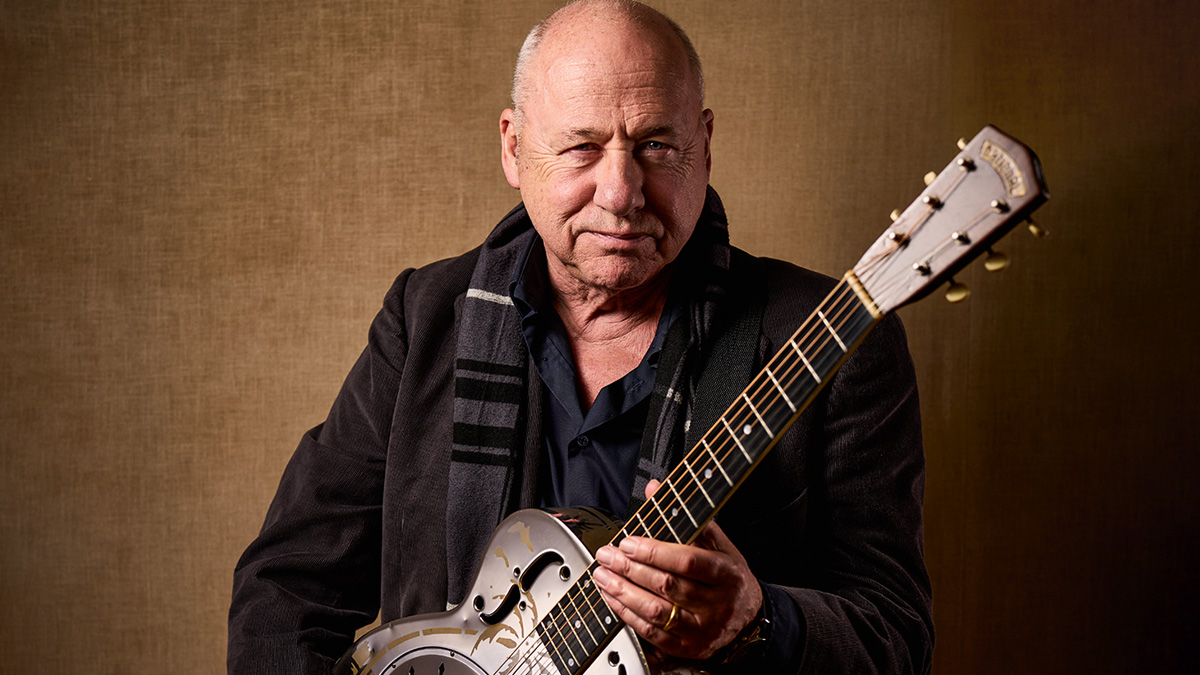“Fingerpicking came from not having an amplifier. After dad forked out for the guitar, I didn't have the nerve to ask him for one”: Mark Knopfler says the lack of a guitar amp growing up helped him develop his now-iconic fingerpicking style
Sensitivity to his family’s finances – as well as an exchange involving his sister and a tennis racket – helped Knopfler on the way to crafting his legendary approach to the guitar

Mark Knopfler says he developed his now-iconic fingerpicking playing style because he “didn’t have the nerve” to ask his father to buy him an amp.
The Dire Straits guitarist released his new album, One Deep River, in April – a record on which his fingerpicking reigns supreme. Now, as a guest on BBC's Desert Island Discs radio show, he's discussed how tight finances growing up – and the lack of a cheeky streak – helped shape his voice as a guitarist.
Speaking to host Lauren Laverne, Knopfler explained how a move to his mother's hometown of Blythe in Northern England when he was five brought him closer to his uncle, who was one of his earliest musical influences.
“I played shockingly bad boogie-woogie piano, taught by my uncle, in the house,” he remembers. “I cannot believe how patient my parents must have been. Then, later on, when I got a guitar I'd be stomping on the floor, but they never stood in the way of it.”
Notably, Knopfler is left-handed, but an exchange involving his big sister and a tennis racket provided a game-changing moment for the budding guitarist – one that prompted him to play right-handed and in turn give him a unique advantage on the instrument.
“My big sister Ruth... we had these dodgy tennis rackets that you could get for not very much money,” he says. “I was pretending it was a guitar, and she swung it around and said, 'That's the way you play it'.”
Ultimately, playing a right-handed guitar meant his strongest hand was commanding the fretboard, rather than doing the picking.
Get The Pick Newsletter
All the latest guitar news, interviews, lessons, reviews, deals and more, direct to your inbox!
“It gives me a little bit of flexibility,” Knopfler explains. “If I played a vibrato I maybe could do it on two or three strings at a time.”
His other hand, meanwhile, was honed as matter of necessity. Without an amp to plug into, he seemingly would find new ways to amplify his sound and make what he played sound as big as possible.
“The fingerpicking came from not having an amplifier,” he reveals. “You know, after dad forked out 50 [pounds] for a guitar, I didn't have the nerve to ask him for an amp. I didn't think it was right.”
Expanding on how he developed his weaker hand in a conversation with Guitar Player in 2022, Knopfler explained: “Eventually, I found myself doing things with just my thumb and two fingers that I couldn't do with a pick. But I still use a plectrum now and again for strumming or for playing on acoustic tracks."
As GP details, it forced him to rely on finesse and economy picking rather than brute force, with mega-hit Sultans of Swing a direct result.
“I went through thumbpicks and even steel fingerpicks with the Nationals [resonator guitars], and I dispensed with them,” he adds. “It's a bit of a disadvantage without them sometimes, because a thumbpick is just great for that chunk thing that Chet Atkins can do so brilliantly.
“A lot of times, I’ll hit a note with the thumb and second finger together, so it might seem as though I'm pinching the string – squeezing it. The second finger hits it first I think, behind the thumb, so you can get a real physicality with a note.”
While fingerpicking has been a key part of his repertoire since those early days, it's only in recent years that Knopfler completely ditched the guitar pick.
“I think lack of use, plus three bouts of COVID, probably phased out the plectrum for me. I just kept losing them and would be fingerpicking more – not necessarily fingerpicking better, just more. And it proved to be just a bit more comfortable for me,” he recently told Guitar Player.
Yet he still talks up the value that picks can bring to your playing: “I want to bow to the plectrum and say it’s a superior thing,” Knopfler admitted. “It’s louder. It’s faster. It’s got a better signal. It’s the best amplifier there is. I would do all the rhythm parts with one all the time.”
One Deep River was released in April after a huge selection of Knopfler's guitars were sold at a record-breaking auction.
A freelance writer with a penchant for music that gets weird, Phil is a regular contributor to Prog, Guitar World, and Total Guitar magazines and is especially keen on shining a light on unknown artists. Outside of the journalism realm, you can find him writing angular riffs in progressive metal band, Prognosis, in which he slings an 8-string Strandberg Boden Original, churning that low string through a variety of tunings. He's also a published author and is currently penning his debut novel which chucks fantasy, mythology and humanity into a great big melting pot.
“I suppose I felt that I deserved it for the amount of seriousness that I’d put into it. My head was huge!” “Clapton is God” graffiti made him a guitar legend when he was barely 20 – he says he was far from uncomfortable with the adulation at the time
“I was in a frenzy about it being trapped and burnt up. I knew I'd never be able to replace it”: After being pulled from the wreckage of a car crash, John Sykes ran back to his burning vehicle to save his beloved '76 Les Paul













